Posts Tagged ‘Colin Channer’
PEN Journey 37: Bled: The Tower of Babel—Part Two
PEN International celebrates its Centenary in 2021. I’ve been active in PEN for more than 30 years in various positions and now as an International Vice President Emeritus. With memories stirring and file drawers of documents and correspondence bulging, I am a bit of a walking archive and have been asked by PEN International to write down memories. I hope this personal PEN journey will be of interest.
At PEN’s 71st World Congress in June 2005 over 275 writers from 88 PEN Centers gathered from around the world in the idyllic setting of Bled, Slovenia where history had been made 40 years before. In 1965, PEN had held its Congress in Bled, the first in Eastern Europe since the Second World War. Russian writers visited PEN for the first time. At that 33rd World Congress, American playwright Arthur Miller, who’d recently passed away in 2005, had been elected the first and only American President of International PEN.
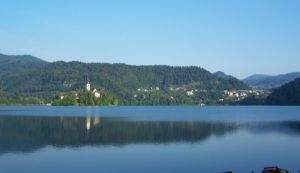
Lake Bled in Bled, Slovenia, site of PEN International’s 71st World Congress, 2005
In 2005 the global dynamics had changed. PEN now had active centers in most of the countries in the former Communist Eastern bloc, including in Russia. The European Union (EU) was in its ascendancy; 2005 marked Slovenia’s accession into the EU. Globalization was bringing benefits but also threats to the cultures of smaller countries.
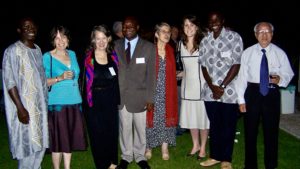
Reception 71st PEN Congress in Bled, 2005. L to R: Frank Asare Donkoh (Ghana PEN), Jane Spender (Program Director PEN International), Joanne Leedom-Ackerman, (PEN International Secretary), Alfred Msadala (Malawi PEN), Cecilia Balcazar (Colombian PEN), Caroline McCormick Whitaker (PEN Executive Director), Dan Khayana (Uganda PEN), Bao Viet Nguyen-Hoang (Suisse Romand PEN) [Photo credit for many photos: Tran Vu]
“We live in an age when many preconceived ideas, nurtured for centuries and ostensibly immutable, are no longer valid,” noted Slovene PEN President Tone Peršak. “The linguistic and cultural image of the world is in flux and civilization as a whole, under the influence of globalization, is taking on a new character. These events are also echoed in discussions within PEN centers…They guided us in our selection of the main topic for discussion at the Congress, namely the issue of linguistic and consequently cultural diversity of the world. The topic is proposed as a question: does linguistic diversity stimulate or hinder cultural development? Is it a curse or a blessing that made possible the emergence and encounter of various world views, different emotional responses to the human destiny, and finally also brought about the formulation of different schools of thought and philosophical doctrines?
“We regard the question of linguistic and cultural diversity also as a human rights issue. Attempts to unify and subject all aspects of life to uniform standards and norms is viewed as a very questionable encroachment on these rights. One of the topics is therefore the question of the need to protect languages and cultures, and that means also the smallest ones which may be on the verge of extinction. Let us also draw your attention to literature’s role in the preservation of the memory of the cultural landscape, which has been undergoing considerable changes and in some cases may even disappear forever…[Is] literature a kind of lingua franca which could and should contribute to a better mutual understanding and insight into the different cultures and nations that sustain cultural diversity?”
These were questions without definitive answers, but questions that occupied writers from dozens of cultures and languages in the Congress’s literary sessions. [At PEN Congresses, the main sessions and the Assembly of Delegates were usually translated into PEN’s three official languages—English, French and Spanish—and also the language of the Congress host.]
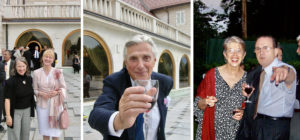
PEN International Congress Bled, Slovenia 2005. L to R: Joanne Leedom-Ackerman (PEN International Secretary), Monika Van Paemel (Belgium (Dutch-speaking) PEN), Alexander Blokh (French PEN and former PEN International Secretary), Cecilia Balcazar (Colombian PEN), Jiří Gruša (President, International PEN)
A number of the delegates had before been to Bled, home of PEN International’s annual Writers for Peace Committee conference, hosted by Slovene PEN. During the Cold War the Peace Committee, founded in 1984, provided one of the only open forums for dialogue between writers from the East and West.
“Let us learn the language of our neighbors so that we all may better come to know and understand our neighbors and forestall incomprehension and conflict,” the Peace Committee and the Congress organizers urged.
In my own address to the Congress as International Secretary, I relied on the prevailing metaphor of the bridge, using an example close to home:
I recently crossed a soaring new bridge in Boston, Massachusetts, a bridge at least 14-years in the making. This bridge spanning the Charles River was the result of what is called the Big Dig, a project anyone who has lived in or regularly visited Boston has come to think of as the Eternal Dig for it is hard to remember when a large segment of downtown wasn’t under construction. But at last there is this soaring bridge with stanchions into the sky in gracious arcs and at night a blue light shining up into its cables as it rises above the city. There is also an elaborate network of freeways and tunnels underground.
I sometimes think International PEN is a bit like the Big Dig. For much of the last decade we’ve been reconstructing ourselves, trying to reflect in our governing structures the expansion that PEN has experienced across the globe, an expansion brought on in part by the opening up of societies after the fall of the Berlin Wall and the lifting of the so-called Iron Curtain. This expansion has also been enabled by the linking of the globe through the internet. International PEN has instituted a Board, been through a long range planning process, revised rules and regulations, and while we still have construction going on and probably always will, I’m hopeful that we too will start to see more and more of the benefits of all this work…Throughout we’ve continued to witness remarkable activities from our Centers…
This year I’ve been telling people that PEN is a place where cultures don’t clash but communicate. PEN members may not always agree, in fact frequently don’t agree, but the fellowship among members can keep that disagreement from turning into confrontation. At our best PEN’s forums offer a place where the energy of competing ideas releases light, rather like that spectacular blue light which shoots upwards on the cables of the grand bridge in Boston.
Arthur Miller once described PEN: “With all its flounderings and failings and mistaken acts, it is still, I think, a fellowship moved by the hope that one day the work it tries and often manages to do will no longer be necessary. Needless to add, we shall need extraordinarily long lives to see that noble day. Meanwhile we have PEN, this fellowship bequeathed on us by several generations of writers for whom their own success and fame were simply not enough.”
The work included substance and form, the latter focusing on the organizational structure which allowed the work to go forward. At the Bled Congress the delegates approved procedural reforms, broke into workshops to discuss PEN itself and global and regional issues, and were introduced to PEN’s first Executive Director, who would begin the following month. After an extensive search, the board and staff had agreed to hire Caroline Whitaker (née McCormick) who had worked in theater development, had a degree in literature and was coming to PEN from the Natural History Museum where she was Director of Development.

Writers in Prison Committee and Workshop Sessions, PEN International Congress, Bled, Slovenia, June 2005
At the Congress seven candidates from Algeria, Colombia, Croatia, France, Finland, Japan, and Russia ran for positions on the International Board, and Mohamed Magani (Algerian PEN), Sibila Petlevski (Croatian PEN), Sylvestre Clancier (French PEN), and Takeaki Hori (Japan PEN) were elected.
The Congress discussed and passed over 20 resolutions and actions challenging the situations for writers in Algeria, Basque region of Spain, Belarus, Burma, China, Cuba, Iran, Maldives, Mexico, Nepal, Russia, Syria, Tibet, Uzbekistan, and Vietnam as well as resolutions relating to the attacks on journalists in war zones and the crackdown on internet writing in Tunisia where the World Summit on the Information Society was to be held that fall.
The Congress also noted the tenth anniversary of the death of PEN member Nigerian writer Ken Saro-Wiwa. International PEN President Jiří Gruša noted: “We are living in a time of extraordinary threats to writers and the freedom to write. In the ten years since our colleague Ken Saro-Wiwa was executed in Nigeria, hundreds of writers and journalists around the world have died by violence. Crackdowns on internet writers and anti-terrorism legislation have named writers and chilled freedom of expression in a number of countries.
“While our colleagues in countries such as Myanmar, Cuba, China and Belarus continue to struggle against conventional governmental censorship and repression, writers also face the threat of moral violence in countries from Mexico to Iraq and new pressures associated with writing and publishing on the internet.”
Among the guests at the Congress were Colin Channer, who introduced the prospective Jamaica PEN Center which was voted into PEN at the subsequent 2006 Congress in Berlin.
And for the first time since the Tiananmen Square massacre June 4, 1989, a writer from the People’s Republic of China attended as a representative of the new Independent Chinese PEN Center whose members included writers from inside and outside of mainland China. I include below much of his talk which rings truer than ever.
Wang Yi* addressed the Assembly, noting that this was the first time in 16 years “the voice of a non-official and independent Chinese writers’ group could be heard, a group that is independent or at least strives for its independence, that is free or at least longs for freedom and that tries to perpetuate the freedom of expression in the face of great political pressure…
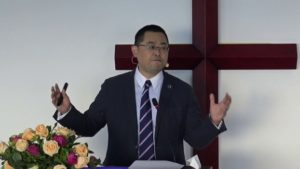
Wang Yi (Independent Chinese PEN Center)
“I come here heavy-hearted without blessing, because there is no reconciliation between a free writer, an independent intellectual, and his government. I come to Bled representing those who have been disgraced, who have stood in the shadow of terror and the peril of political oppression, and who have yet never resigned but have insisted upon their freedom of speech and writing, such as Mr. Liu Xiaobo whose work has been not allowed to be published and who has not been allowed to go abroad. I also come for myself, who experienced in the sixteen years after Tiananmen a long period during which memories have been erased forcefully and silence has been ordered. This has been a time during which mothers, who lost their sons and daughters at Tiananmen, have not been allowed to weep…
“To me and my colleagues, writing is a rescue plan for the hostage. Writing means dignity and freedom; it is kind of belief. But we cannot rescue ourselves, even when we have courage and when justice is on our side in the face of institutional arbitrariness…
“Our salvation depends upon that higher community, depends upon common universal values that we share as writers, as free people and as intellectuals. It is the source of liberty and imagination…
“We are disappointed to see that some European governments are gradually abandoning free values and lessening their criticism of the despotic regime in Beijing. For a common benefit they abandon the writers, reporters, dissidents and orators who are imprisoned…
“According to the Independent Chinese PEN club, more than 50 writers and reporters are currently in jail…
“I want to mention two points: the first one is the belief that through writing, we can enlighten and preserve basic human values. Second, there is a global realistic linguistic environment. These two points make me think that the persecution of Chinese, Tibetan, Uighur and other minority writers reaches across borders to become an international issue…There is only the suppression of the right to freedom of expression and the persecution of human beings, which needs to be rooted out, and the victim needs to be consoled and supported…
“The Chinese government’s suppression of writers has accelerated in recent years, since the beginning of the Internet era…pen names and pseudonyms are prohibited. With this act, the last bastion of self-protection is destroyed.
“Every morning, the Communist Party’s propaganda department issues a list of prohibited news to the media. Whoever dares to break the taboos will get into big trouble. As the government stifles the mouths of the media and betrays the public, it also tampers with the truth in historical textbooks and deceives the children in school. An increasing number of courageous writers, reporters and public figures are daring to challenge the status quo so more and more of them have been thrown into jail on charges of committing the crime of “instigation and subversion of the state” or “disclosing state secrets” to “hostile forces…
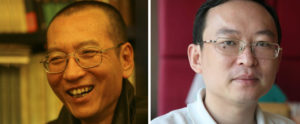
Liu Xiaobo and Yu Jie (Independent Chinese PEN Center)
“Among the harassed and persecuted are also the president of ICPC and his deputy, Mr. Liu Xiaobo* and Mr. Yu Jie*. Under such circumstances, you cannot but regard the Chinese writer as a hostage…
“I come to Bled hoping to present myself as a writer, but I am indeed only a hostage…One of the reasons that I definitely wanted to come is that I believe we all belong to the same world. In this world, the state, the glory and the lawful right all belong to that higher spiritual origin that makes us, without regret, proud to be a writer.”
*[Wang Yi, deputy Secretary General of ICPC 2003-2007, has been imprisoned in China since December 2018, serving a 9-year sentence for “activities disobedient to the government control” and “inciting subversion of state power and illegal business.” Wang Yi is a writer and a Christian pastor. Liu Xiaobo, the second President of ICPC, was sentenced in December 2008 to an 11-year prison sentence as “an enemy of the state” for “incitement of subverting state power.” He was the first Chinese citizen to win the Nobel Prize for Peace in 2010 and died in custody June 13, 2017. Yu Jie, a celebrated writer, was one of the drafters, along with Liu Xiaobo, of Charter 08, which set out a democratic vision for China; he was arrested and tortured in 2010 and immigrated to the U.S. in 2012. He is author of Steel Gate to Freedom: The Life of Liu Xiaobo.]

Lake Bled, Slovenia, site of PEN International 71st World Congress, 2005
Next Installment: PEN Journey 38: PEN’s Work On the Road in Kyrgyzstan and Ghana
PEN Journey 33: Senegal and Jamaica: PEN’s Reach to Old and New Centers
PEN International celebrates its Centenary in 2021. I’ve been active in PEN for more than 30 years in various positions and now as an International Vice President Emeritus. With memories stirring and file drawers of documents and correspondence bulging, I am a bit of a walking archive and have been asked by PEN International to write down memories. I hope this personal PEN journey will be of interest.
A few days before I flew out to Dakar, Senegal for a PEN conference in November 2004, my youngest son, a Marine in Iraq, called and told my husband and me that we would not hear from him for a while. We knew, without being told, that the U.S. and British troops were likely about to return to Fallujah, the center of the insurgency. Civilians there had been advised to get out of the city, and they were leaving.
On the opening day of the PEN conference in Dakar, November 7, 2004, the battle for Fallujah began. The headlines in the newspapers in Dakar were about the civil war raging in neighboring Ivory Coast so I was not reading about Iraq during the five-day PEN Africa meeting. In 2004 there were no iPhones or phone news feeds and rare coverage of the Middle East was on the evening news. I was quietly attentive each day and prayerful and focused on PEN’s work.
I have modest notes from the first PAN Africa conference, but I have some of my most vivid memories, most particularly of the people I met and of my first trip to Gorée Island just off the Senegalese coast opposite Dakar, a place of its own historic upheaval. Gorée Island was the site of the largest slave-trading center on the African coast from the 15th to the 19th century, ruled successively by the Portuguese, Dutch, English and French. The dungeons and portals to the sea where men and women and children were sent out in chains still stood along with the stucco houses of former slave traders.
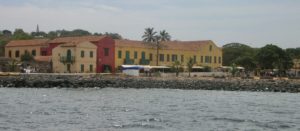
Gorée Island, site of slave trading in 15-19th centuries, off coast of Dakar, Senegal
A tall Gambian doctoral student assisting Senegalese PEN guided a few of us around Gorée. Fluent in French, English and Spanish, he was writing a doctoral thesis on the secrets of history and myth in the epic of Kaabu according to Mandingo oral traditions—clearly a future PEN member. Thoughtful, knowledgeable, he spent the day sharing history. During and after the Dakar meetings, our paths crossed in subsequent PEN conferences and congresses, and we know each other still. Dr. Mamadou Tangara earned his doctorate at the University of Limoges in France shortly after and eventually became the Gambian Permanent Representative to the United Nations. During Gambia’s constitutional crisis in 2016-17, he and other diplomats called for the president to step down peacefully; he was dismissed, but when power changed hands a few months later, he was reappointed as Minister of Foreign Affairs for the Gambia. The friendship with Mamadou Tangara remains and is one of my many valued friendships from PEN.
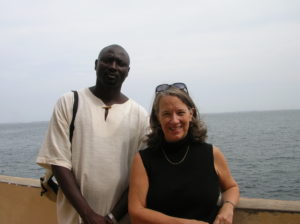
Mamadou Tangara (Gambia) and Joanne Leedom-Ackerman (PEN International Secretary) on Gorée Island at PEN’s 2004 Dakar conference
Mamadou’s mentor at the time was an older Gambian journalist and editor Deyda Hydara, who joined PEN members from more than a dozen African centers in this conference to prepare for PEN’s first PAN African World Congress in Senegal in 2007. The Congress would be PEN’s first in Africa since the 1967 Congress in the Ivory Coast when American playwright Arthur Miller was International PEN President. Though the Gambia didn’t yet have a PEN Center, Deyda was planning on starting one. At the time Deyda Hydara was co-founder and primary editor of The Point, a major independent Gambian newspaper. He was also correspondent for AFP News Agency and Reporters Without Borders and was an advocate for press freedom and a critic of his government’s hostility to the media.
A month after PEN’s Dakar conference, the Gambian government passed a bill allowing prison terms for defamation and another bill requiring newspaper owners to purchase expensive operating licenses and register their homes as security. Deyda Hydara announced his intent to challenge these laws. Two days later on December 16, 2004 Deyda Hydara was assassinated on his way home from work. To this day his murder remains unsolved. The following year Deyda Hydara won PEN America’s Freedom to Write Award posthumously and later the Hero of African Journalism Award of the African Editors Forum.
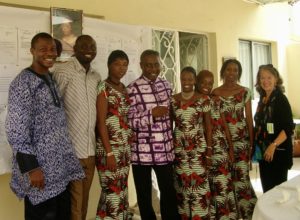
PAN Africa meeting at Senegal PEN offices. PEN L to R: Remi Raji (Nigerian PEN), Mamadou Tangara (Gambia), Mike Butscher (Sierra Leone PEN), Joanne Leedom-Ackerman,( PEN International Secretary) and Senegal PEN assistants
Deyda Hydara was a dynamic voice for writers at the PEN Dakar conference and for the need of PEN’s African centers to work together against repressive press laws.
The theme of the Dakar meeting—“New Partnership for African Development and Culture”—involved coordinating work among PEN’s African centers, including the nomination of a candidate for International PEN’s board at the 2005 Congress in Bled, Slovenia, assistance to dormant African centers and support for creating new African centers. (There are now more than 25 PEN centers in Africa.) Several African PEN centers also committed to working together in fundraising for projects. Remi Raji of Nigerian PEN took on the role of PAN coordinator, and Mike Butscher, executive secretary of Sierra Leone PEN, was the administrator.
PAN (PEN African Network) was relatively new. In 2001 Dr. Vincent Magombe, a Ugandan journalist and member of PEN’s African Writers Abroad Center and member of PEN’s first International Board and Terry Carlbom, PEN’s International Secretary, had taken a trip to visit many PEN African centers in order to promote activity and develop greater participation in Africa. At the 2003 Mexico Congress members from seven of PEN’s African centers met to launch the PEN African Network (PAN). At the 2004 Congress in Norway representatives from twelve African centers came together for a PAN meeting. By Dakar PAN had grown to over a dozen of PEN’s African centers who agreed to help plan the 2007 World Congress in Dakar.
The implementation and heavy lifting for the Congress would depend on PEN Senegal, one of the oldest and best organized of PEN’s centers in Africa. Senegalese PEN had offices, a small theater and even housing for visiting writers, administered by its General Secretary, poet Alioune Badara Bèye. Because the country’s first President (1960-1980) Leopold Sédar Senghor was himself a renowned poet and a Vice President of International PEN, Senegal had a long tradition of support for literature that was unparalleled in most countries.
The Dakar PAN conference opened on the International Day of the African Writer and was coordinated with the Senegalese Writers’ Association and presided over the by the Minister for Culture. The ceremonies included a literary evening along with traditional Senegalese instrumental ensembles and dance.
The planning work for the 2007 Congress got underway the following day in a large meeting room in Senegal PEN’s writers’ compound. As International Secretary, I addressed the gathering and shared a 1922 news report about PEN that began: Le Coeur n’a pas de pays. (The heart has no country) then continued: “Today when many are claiming a clash of civilizations and fear across borders is rising, PEN can continue to demonstrate international fellowship through its literary programs, its work on behalf of imperiled writers, its support of writing in all languages and cultures, its assistance to writers in exile and its development of new centers, particularly in Africa. PEN’s strength is its members, and it is a pleasure to be here with committed writers from some of PEN’s strongest and also PEN’s emerging African centers.”
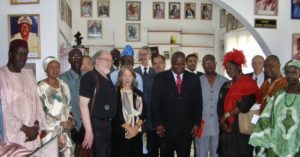
International Day of the African Writer and PEN’s PAN Africa conference at Senegal PEN. Participants, including far left Alioune Badara Bèye, (General Secretary, Senegal PEN), Kjell Olaf (Norweigan PEN), Joanne Leedom-Ackerman (PEN International Secretary/American PEN), Femi Osofisan (Nigerian PEN), Terry Carlbom (Swedish PEN), Senegal Minister of Culture, Deyda Hydara (Gambia), Mike Butscher (Sierra Leone PEN) and other PEN members and officials.
Given the conflict next door in the Ivory Coast and in Iraq, Afghanistan and other areas of the world, it seemed especially important to have these positive actions of fellowship growing. While the PAN conference was serious in purpose, it was also full of comradery. I chaired one session and remember looking out at the table of more than a dozen men and only one woman besides myself. I suggested at PEN’s follow-up conference in Ghana next spring, the centers include their women members. The men looked around the table as though only now noting the imbalance. I smiled. The other woman at the conference Koumanthio Zeinab Diallo from Guinea spoke French, and when the translator repeated my words to her in French, she smiled. C’est vrai! and nodded her approval.
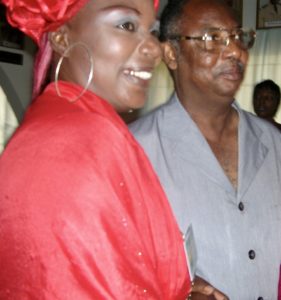
Zeinab Diallo (Guinea PEN) and Deyda Hydara (Gambia) at 2004 PEN PAN Conference in Dakar, Senegal.
Since I had taken on the position of International Secretary, I’d been studying French to get to a passable conversational level. It turned out Zeinab was studying English with the same goal. Mamadou Tangara set up a competition between us which he judged every time the three of us saw each other over the months and years ahead at PEN meetings. Even with our salad of language, Zeinab and I communicated and often laughed together though I don’t think either of us achieved the fluency we wanted. A poet, Zeinab wrote in Pular as well as French. She also worked as an Agricultural Engineer and was a development consultant for the UN Development Programme.
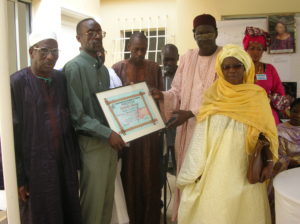
Senegal PEN members including General Secretary Alioune Bedara Bèye presenting tribute posthumously for Senegal writer and member Fatou Ndiaye Sow.
At the PAN conference Senegalese PEN presented an award and tribute to its member Fatou Ndiaye Sow who had passed away just the month before while attending a meeting abroad. A poet, teacher and children’s writer, Fatou had been a friend to many of us and was an early member of PEN International’s Women’s Committee. I read a tribute to Fatou by Lucina Kathmann, a close friend of hers and early chair of PEN’s Women’s Committee.
When I took on the role of International Secretary a few months before, there was already a full agenda underway, and I was grateful to Terry Carlbom, my predecessor, and to Jane Spender, the Administrative Director; Terry also attended the Dakar conference. The next three PEN Congresses were lined up to be developed—Bled, Slovenia in 2005, Berlin, Germany in 2006, and Dakar, Senegal in 2007. Each of these would be hosted by experienced PEN centers so while much work was yet to be done and funds raised for these Congresses and for other activities ahead, solid groundwork had been laid.
A new initiative in those early days as International Secretary was to revive and develop PEN’s presence in the Caribbean. The request originated with the UNESCO representative in Jamaica who was himself a writer. A proposal to explore the possibility was developed in partnership with Canadian PEN’s Executive Director Isobel Harry, who’d spent time in Jamaica, had known one of its most famous residents, musician Bob Marley, and knew numbers of Caribbean writers living in Toronto, some of whom were members of Canadian PEN.
Historically, the Caribbean had been underrepresented in PEN except for the existing Puerto Rican Center and a Jamaican PEN Center that had been active from 1948 until the early 1980’s but had disbanded in 1987.
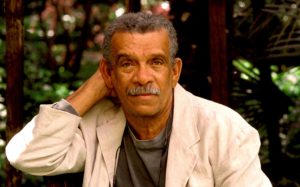
Poet/playwright Derek Walcott, winner 1992 Nobel Prize for Literature. (photo credit: Effigie/Leemage/Writer Pictures)
The Caribbean was enjoying a literary renaissance with events like the CARIFESTA (Caribbean Festival of the Arts), the Calabash Literary Festival and with St. Lucia’s Derek Walcott winning the Nobel Prize for Literature.
In early December, 2004 Isobel and I traveled to Jamaica to meet with writers, professors and UNESCO to determine who and how a PEN center might be launched. PEN Canada had an ongoing relationship with Caribbean writers as did Quebecois PEN, which was working with Haitian writers to help develop a PEN center there. Haitian writer Georges Anglade, who lived part time in Montreal and was the founding President of Haitian PEN, had recently attended the PEN Congress in Tromso, Norway. (Ref Haitian Farewell)
At the minimum, to form a new PEN center at least 20 qualified writers have to come together, sign and agree to commit to the Charter of PEN and propose a reason and program for their center.
Isobel and I flew to Kingston, arriving from the early blasts of winter into the Jamaican sun. It was not hard duty. Over the course of three days we met with a dozen writers, professors, festival organizers, human rights activists and the UNESCO representative Alwin Bully, who was also Chair of the CARIFESTA Task Force. UNESCO’s mandate was to integrate the Caribbean, and Alwin Bully saw PEN as a unifying organization and thought a PEN Center might include writers from many of the Caribbean islands.
Isobel and I met with him several times as well as with the founders and producer of the Calabash International Festival and with journalists from the Jamaica Observer, professors at the University of the West Indies, chief curator of the National Art Gallery, the Vice Chancellor of the University of the West Indies, and the former head of the Human Rights Council. All were enthusiastic about the possibility of a PEN Center.
Colin Channer and Kwame Dawes, founders of the Calabash International Literary Festival, offered to host a planning meeting before the next festival. UNESCO offered to fund the workshop/planning session and include writers from many Caribbean countries. The Vice Chancellor of the University of the West Indies, which had three main campuses in Barbados, Trinidad and Jamaica, said the university could perhaps provide institutional support. Professor Carolyn Cooper of the Department of Literature in English and board member of the Calabash Festival and a writer said she’d be glad to be a founding member and help recruit so that the PEN center had an inclusive group of all types of writers.

L to r: Novelist Colin Channer (photo credit: Allison Evans), poet Kwame Dawes (photo credit: Andre Lambertson), founders of Calabash International Literary Festival, and Professor Carolyn Cooper of the University of the West Indies (photo credit: Isobel Harry)
Florizelle O’Connor, the former head of the Human Rights Council and member of the UN Sub Commission on Human Rights was also enthusiastic about a PEN center. She felt the right to freedom of expression and access to information were issues that needed protecting in Jamaica and the Caribbean.
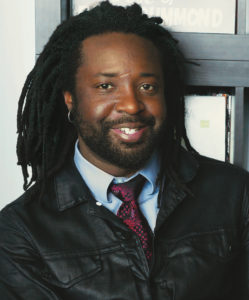
Novelist Marlon James, 2015 Man Booker Prize winner
Questions arose on where a Caribbean PEN center would be located—Jamaica, Trinidad, other? Other writers, including journalists from the Jamaica Observer, emphasized that a center would need equal representation of writers and journalists and no one constituency should be keeper of the PEN flame.
Writers who lived part time in Jamaica and part time in Toronto, New York, London and elsewhere noted that most writers far from home sought ways to keep strong the bonds and identity with the Caribbean; a PEN center could help. Each interview resulted in a list of at least four to six more people to speak with, including later Marlon James, who would eventually win the Man Booker Prize.
At the end of our three-day trip circling Kingston aglow with red, green and gold Christmas lights and swaying palm trees, we concluded a PEN Center would happen. At its best it could bring together writers, journalists and creative people in the islands and provide further access to each other, broaden access to the world of literature and enable writers to present a collective voice for greater impact on issues such as freedom of expression.
The writers would have to decide the questions ahead—who would be eligible, the balance of journalists and creative writers and the diasporic writers whose numbers might exceed the local writers. A large unresolved question was whether the PEN center would be Jamaican PEN as in the past or a pan-Caribbean PEN.
As we left the island to return to our winter, it was agreed the discussions would continue among the writers, including those Caribbean writers in New York, Toronto and London and with UNESCO. A workshop/planning meeting in association with the Calabash Festival and the University would be held, probably in May 2005. Isobel would return.
In 2006 the Jamaica Center was voted into PEN at the Berlin congress and joined over 135 PEN centers worldwide.**
Next Installment: PEN Journey 34: Diyarbakir and Beyond—Finding Byways for Peace
——————-
*Current African PEN Centers: Afar, Afrikaans, Algerian, Egyptian, Eritrean in Exile, Ethiopian, Gambian, Guinea-Bissau, Guinean, Ivory Coast, Kenyan, Liberian, Malawian, Malaysian, Mali, Mauritania, Moroccan, Nigerian, Senegal, Sierra Leone, Somali-Speaking, South African, Togo, Tunisian, Ugandan, Zambian, Zimbabwe
**Current Caribbean PEN Centers: Cuban, Haitian, Jamaican, Puerto Rican